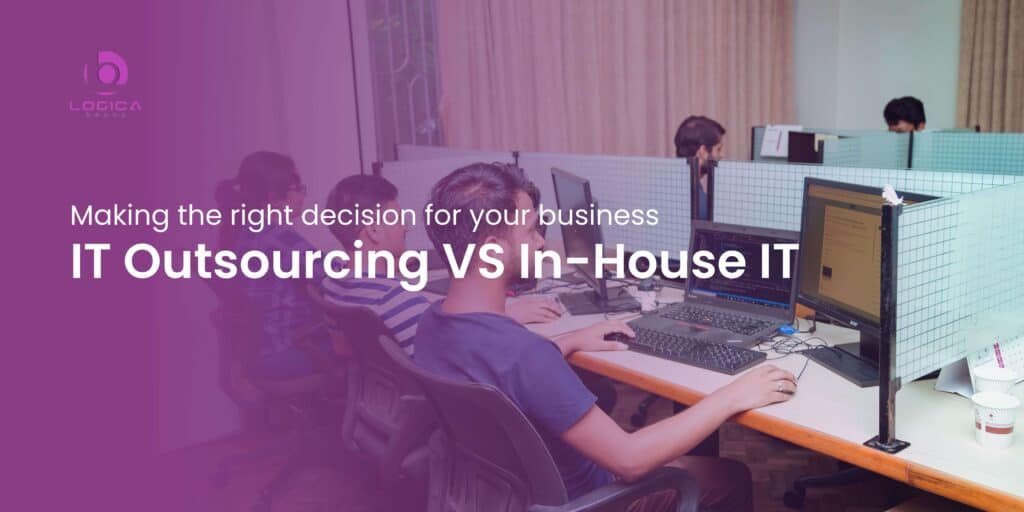Do you currently require additional assistance for your business? You might be debating whether to outsource work or bring on a new full-time team member. The best choice isn’t always obvious because both of these strategies have advantages and disadvantages.
This blog is written with the intention of assisting you in making a well-informed decision regarding whether to outsource or keep your work in-house.
IT Outsourcing VS In House IT
What is IT Outsourcing?
In order to save costs and maintain complete control over all operations, a business may choose to outsource some of its software development. In essence, you delegate task execution to the partner while keeping an eye on things. Both domestically and abroad are viable options for IT outsourcing. There are three basic types of outsourcing that relate to the location of the service:
● Onshore Outsourcing
● Offshore Outsourcing
● Nearshore Outsourcing
Entrepreneurs, especially startup owners, can advance their companies more quickly and save more money with IT outsourcing than they could with a small in-house team. Large corporations like Google, Apple, and Facebook also outsource some of their work because it gives them access to professionals with different specialities. Businesses can now outsource a wide range of tasks or services. Outsourced information technology services are frequently provided, including programming, application development, and technical support. Call centre and customer service tasks are frequently outsourced.
They can also outsource tasks related to production, HR, and financial operations like bookkeeping and payroll processing. Businesses may choose to outsource entire departments, such as their entire IT division, or merely particular sections of a given department.
Some of the services are:
● Web app development
● Mobile App Development
● Software Development
● Staff Augmentation
Benefits of Outsourcing IT
Outsourcing your IT department in full or in part to an experienced managed services provider has a number of benefits.
You get a group of professionals
As already mentioned earlier, it is expensive and time-consuming to hire knowledgeable internal workers and keep up with changing IT requirements. A team of professionals in every branch of technology, including data management, system administration, and cybersecurity, is available from managed IT services companies.
The equipment and technological partnerships required to update your infrastructure are also available from outsourced IT businesses, saving you from having to buy items that could become obsolete in a few years.
You can get to them any time
An internal staff may be able to respond more quickly, however this is often only true during regular business hours. A managed IT company will provide you with emergency services and round-the-clock assistance if you experience downtime so that you can quickly get back to work. Additionally, you won’t be limited to or charged extra for evenings, weekends, or holidays.
The level of service quality is great.
An external technology partner has an interest in your company because it wants to continue working with you. They must continue to demonstrate their value to your business because they often have just as long as the first contract to keep you committed. You may choose an IT business that has a track record in your sector if you want to avoid worrying about industry rules and compliance.
They are frequently more economical
Although initially it could appear more cost-effective to hire one or two employees, you must also take into account all of the expenses associated with keeping personnel, such as hiring replacements, increases, benefits, training, and sick leave.
Disadvantages of IT Outsourcing
You can save a ton of time, money, and worry by outsourcing IT, but you should still be aware of any possible drawbacks.
You have fewer options
You won’t have the same level of control over your IT operations as you would have with an internal staff. While you and your managed IT provider might work closely to establish priorities and goals, you won’t be able to simply keep an eye on their progress or change course. Frequent meetings can help you keep your managed services provider responsible and retain visibility.
You could find it challenging to communicate
You can experience communication issues since outsourced IT providers work remotely. You won’t have many face-to-face interactions with your IT staff, and you might not get replies as soon as you’d want. However, communication shouldn’t be a big problem if you wish to take a hands-off approach and completely trust your IT business to make the correct judgments.
What is In-house IT?
Being “in-house” refers to an activity or process that is carried out by a company in-house rather than by outsourcing. “The business uses its own resources, including time and personnel, to carry out a commercial activity, such as financing or brokering. Contracting with outside help to complete these tasks, frequently through another company, is the opposite of outsourcing. A company may decide to keep some tasks in-house, such as technical support, marketing, payroll, and bookkeeping. Even though it may be less expensive to outsource some departments, there are some circumstances where it makes sense to hire in-house experts.
Benefits of In-House IT
There are several benefits to hiring a committed group or staff individual that is knowledgeable about your IT infrastructure.
They are completely familiar with your company
Internal IT professionals are familiar with your infrastructure and how your team members utilize their PCs. They care about the success of your business and are friendly with your staff, so they will be motivated to provide solutions that benefit everyone.
They are fast to react
Time is critical when a tragedy or issue arises. If there are any technological problems, an internal IT staff can respond right away. A staff person can start working on the problem right away with only a quick tap on the shoulder or phone call to an extension. Rapid reaction times help minimize downtime and prevent harm before it grows worse.
You are in more control
When IT is managed by you, you have more control over reaction times and the caliber of work. With a budget for that division, you can guarantee that your team is educated on the precise IT solutions you want while keeping expenditures in check. Although an in-house team might operate more slowly than an outsourced IT firm, that team can also develop complete solutions and the supporting documentation, whereas an outsourced IT firm can charge more for new tasks.
Disadvantages of In-House IT
While there are clear advantages to keeping IT personnel on staff, there are also some important drawbacks to consider.
It is pricey
When hiring an IT employee, you must take into account the cost of their salary, perks, and on-boarding. To keep your workforce up to date on the most recent technology, you also need to account for the costs of ongoing training and certification.
It isn’t always accessible
You won’t simply require IT assistance throughout the typical Monday through Friday workweek. On the weekends or after work, when your personnel might not be accessible, emergencies might happen. Additionally, you’ll likely be required to pay time and a half for any work done during the holidays.
It is going to lag
Critical software patches and support issues may accumulate rapidly, especially if your internal department is tiny or a staff member is absent. As a result, your team is always putting out fires and taking care of low-level support issues for non-technical staff members rather than investing time keeping up with new trends and technology.
Risks involved with IT Outsourcing and How to mitigate it?
Despite the fact that there has been extensive study in the field, managing IT outsourcing initiatives is not simple, and many projects end in failure. With careful planning and preparation, many of the risks associated with outsourcing software development may be reduced, but nothing is more helpful than being aware of the potential pitfalls and how to prevent them.
What are the typical things to be aware of ?
The trust problem
How you can trust someone thousands of kilometers away has undoubtedly also entered your mind if you are at the point of debating if outsourcing company procedures is a smart idea. The level of this trust is based on the number of points an outsourcing firm may get from a risks analysis and whether or not these risks can be minimized. Verifying these with an outsourcing business you’d like to work with in the future might help you make predictions about how successful your endeavor will be.
Solution: Check the maturity of the company, Quantity of long-term projects, websites, social-media activity, case studies, client’s feedback, code examples.
Domain knowledge
Your judgement of an IT outsourcing firm should also be influenced by its domain expertise, or more specifically, the field of professional skills and advancement. Companies often give information about certification, and many are certified to very high standards of quality. Your vendor team’s credentials, including their education and work history, are equally crucial.
Solution: Find out the technologies the chosen vendor has experience with, look at the projects it has completed, and quantify and assess its successes.
Lack of knowledge regarding remote teams
Clients frequently assert that they are not prepared to recruit or outsource remote teams or that they must have all employees situated locally. This typically occurs if the founders of the business lack experience in managing and outsourcing remote IT activities. If you select a novice service provider, the problem might spiral out of control. It goes without saying that you don’t want suppliers working with you to experience their first remote job.
Solution: Pick a business with a proven strategy for integrating remote teams. The presence of this model demonstrates that a vendor has the knowledge and abilities necessary for fruitful partnership.
Intellectual property and confidentiality
When you outsource, you give a different firm a portion of your IT infrastructure. By doing this, you provide the outsource access to sensitive information including business procedures, personnel information, and other crucial data. Therefore, it seems sense that you would be concerned about how the outsourcing provider manages the security of your resources.
Solution: Your security worries might be allayed by choosing an IT provider that adheres to global security standards. Try utilizing (C.A.N) to assist in your search for a reputable outsourcing firm:
● Verify whether the business is willing to sign an NDA (Non-Disclosure Agreement)
● Inquire about the company’s prior experience handling sensitive data.
● Include in the service-level agreement the relevant provisions for the protection of intellectual rights and confidentiality. Also, ask them if they have worked on any projects in sectors comparable to the one you operate in.
Making the Right Decision for Your Business
How can businesses determine whether outsourcing or in-house IT is the right choice for them?
Both retaining certain activities in-house and outsourcing specific positions have advantages and downsides. In comparison to managing an outside contractor, a corporation has more control over the planning and administration of work done by its own workers. On the other hand, external businesses could be more equipped and have greater expertise with specific activities, such legal services. A business must also pay its internal employees’ full salaries and benefits. Depending on the nature of the activity, outsourcing such positions to another business may or may not be more expensive than maintaining those roles within.
Don’t let comparisons get in the way of deciding what tasks your company should and shouldn’t outsource. Even if he owns a home design firm, the founder of a nearby company could have experience in accounting. Due to the competence of its creator, that company might not outsource accounting, while your company may lack accounting experience and must outsource this duty. For every organization, it is different. It’s crucial to understand the advantages and disadvantages of both recruiting internal employees and outsourcing.
Summing Up
As you can see, there are a variety of advantages and hazards associated with outsourcing. Fortunately, when the team selection and development outsourcing are carefully planned, the above-mentioned outsourcing hazards may be quickly avoided. A comprehensive assessment of your demands is the key to making the best selection for your company. Start your outsourcing efforts with the routine chores that don’t contribute to your competitive edge.










